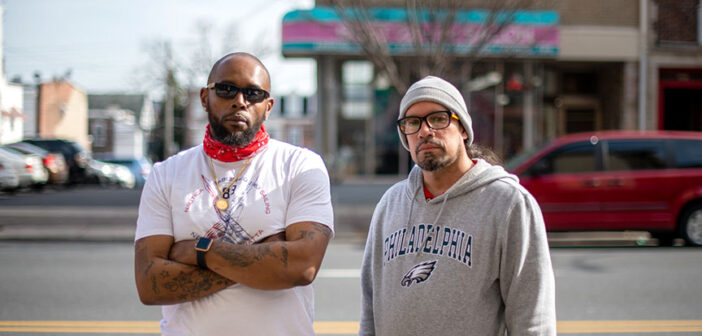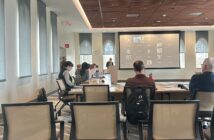Jose Rivera, director of community transformation for Promise Neighborhoods of the Lehigh Valley, was told in fifth grade that his family should save money for bail instead of college.
Rivera said he was judged based on the people he hung out with, judged on where he came from and grew up not having educators that believed in him.
“Educators have to understand that they are our community leaders also,” he said. “We look up to them as children.”
Rivera has been involved in the Latin Kings, a street gang, for 31 years, and has been in and out of prison for the last 28 years.
He grew up in the Allentown projects and was raised by a single mother. He never knew who his father was and his uncle and grandfather helped raise him.
“I got in it for all the right reasons, what it was supposed to be about, but somewhere down the line, the message got changed,” he said.
Rivera’s friend and co-activist at Promise Neighborhoods, Naquon Godfrey “QB,” said he had his life changed in 1994 when he lost his grandmother.
“Growing up in Brooklyn, New York, grandmother was queen of the whole household,” Godfrey said. “No matter what your mother said, your grandmother runs everything.”
Godfrey grew up in a large household with numerous siblings and cousins and also didn’t have a relationship with his father, who was often in prison.
Godfrey said it was members of the Bloods that showed him genuine love at his grandmother’s funeral. He said that is what ultimately led him to joining the group at age 14.
Rivera and Godfrey have not let their respective histories stop them from wanting to make a positive impact on the youth in Allentown.
They have both been incarcerated multiple times for illegal actions with their respective gang members, but those who have worked with them know the two to be genuine, smart and kind people, said Sirry Alang, Lehigh associate professor of sociology and health, medicine and society. They were given second and third chances to prove that they can be difference makers in the Lehigh Valley through Promise Neighborhoods.
Rivera and Godfrey said they don’t want their own children or anyone to follow the same route they took.
“Whether it was indulging in crime or gang activity, they wanted a sense of belonging, they wanted a sense of mastery that they can only get in those areas,” said Hassan Batts, director of operations at Promise Neighborhoods.
Rivera knew he needed to find a new life route at age 42 when he knew he couldn’t handle more years in prison.
He was fired from a job 29 days in once his criminal record came up.
Rivera started his higher educational journey at Lehigh Carbon Community College and jumped in on a second chance program the school had in 2017. He remained on the school’s dean’s list for two years.
In March 2019, Rivera was eligible for parole, but he denied the opportunity because he wanted to finish his degree.
He said if he didn’t finish his last two semesters, he was going to fail.
He graduated from Lehigh Carbon Community College in May 2020 and has been out of prison for 19 months now.
Rivera, now 49 years old, is enrolled at Muhlenberg College through their School of Continuing Studies program. He said he needed letters of recommendations in order to be accepted and said there was a group of individuals that sent letters on his behalf.
He is also the father of seven children and said the three mothers involved gave him the opportunity to talk to them when he was in prison. Rivera said he speaks to his four eldest children on a weekly basis.
“Once you change that fixed mindset, into a growth mindset, people change,” he said. “We have to find that sense of ‘I belong’ and hope. I got discharged from the prison, one of my professors picked me up, brought me right here to Promise Neighborhoods.”
Godfrey has been the father to seven children, but has lost two of them. He said even when he was in prison for six years, his children were the only ones who believed in him.
Godfrey was released from prison in 2018 and hasn’t been back since. He said he didn’t want to let his children down again.
“I’m not afraid to say I cried a lot of nights,” he said. “I cried a lot of nights because I couldn’t afford to fail my kids again.”
He said he got fired from two jobs for a misaccusation and for throwing up from a stomach virus. Godfrey was then brought over to Promise Neighborhoods for another chance.
There, Godfrey said, he felt at home.
“It was like Cheers, the show called Cheers where you go in and everybody knows your name,” Godfrey said. “It makes you feel wanted. That’s like extra love. You got your family love and all that, but they show real genuine love.”
Pas Simpson, ‘97, program director of Zero Youth Violence within Promise Neighborhoods, has been the biggest believer in both Rivera and Godfrey since they arrived.
He said he helped Rivera get his degree and develop his study habits and helped Godfrey become a city recycling worker in Allentown.
“I believe in their ability to change and make a difference in the community,” Simpson said.
Godfrey said he wouldn’t be where he is today without Simpson.
Rivera said he now sits on five different boards where he is going to make a difference in the community regarding criminal justice, education and health equity.
He is also involved in a coalition of difference makers and is the director of the Lehigh Valley Justice Institute.
“I’m getting a chance to unlearn everything I’ve learned,” Rivera said. “I got 38 years of unlearning to do and that’s a lifetime of learning. It’s just growth. It excites me. “
He said even though he’s committed crimes, he came home from prison and the work he’s doing now is not for recognition, but because it’s a need for the community.
Godfrey credits Promise Neighborhoods for helping him get on the right track, which have helped people such as rape victims, fire victims and children with no direction that could have gone to jail.
He has helped host basketball tournaments for numerous gang members and said he eventually wants to run his own rec center for children in the area.
“I watched these people give clothes off their back to people,” he said. “I’ve actually encountered a conversation with somebody where we actually talked somebody out of going to shoot somebody.”
Alang started a Health Justice Collaborative that collects data of people who are oppressed and marginalized to study the impact of incarceration on health.
Alang collaborated with both Rivera and Godfrey, who have personally experienced structural inequalities.
“Working with them has made me a better researcher,” she said. “They’ve made me a better teacher. They’ve just made me a better scholar working with them. It’s honestly to my benefit and Lehigh’s benefit that we are collaborating with them.”
Rivera believes the Lehigh Valley is on the verge of living up to its title as “The Greater Lehigh Valley,” and said there is more energy than ever before around the area.
People are starting to believe they can make a difference and their voice matters, he said.
“Let’s do the right thing as a community,” Rivera said. “It takes a village. Let’s just continue to work together between school systems, businesses, hospitals. This is how we build our community.”
Godfrey said Promise Neighborhoods is a place that doesn’t discriminate and doesn’t care what color someone is or how they smell.
Batts said the biggest impact of Rivera and Godfrey is they give hope to people that have been oppressed, rejected, pushed out and incarcerated. They show up everyday to give back to the community, be fathers to their children while creating a way for the next generation, he said.
Batts said redemption and restorative justice is real and possible.
“I run into people everyday that talk about how Jose and QB’s story has really inspired them,” Batts said. “It inspires them to know that they can be better, to know they can change (and) to know they can be forgiven for the decisions they’ve made and make up for them.”
Rivera and Godfrey’s stories are told in the Emmy Award winning documentary “Give Me Shelter: Perspectives On Youth Violence.”






Comment policy
Comments posted to The Brown and White website are reviewed by a moderator before being approved. Incendiary speech or harassing language, including comments targeted at individuals, may be deemed unacceptable and not published. Spam and other soliciting will also be declined.
The Brown and White also reserves the right to not publish entirely anonymous comments.